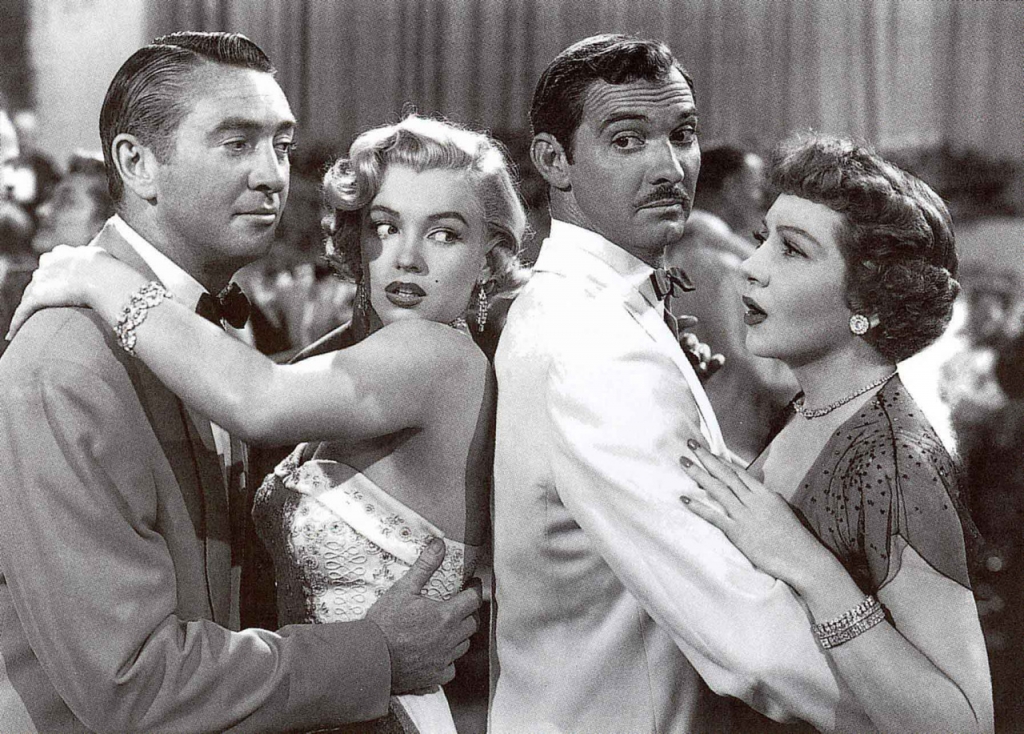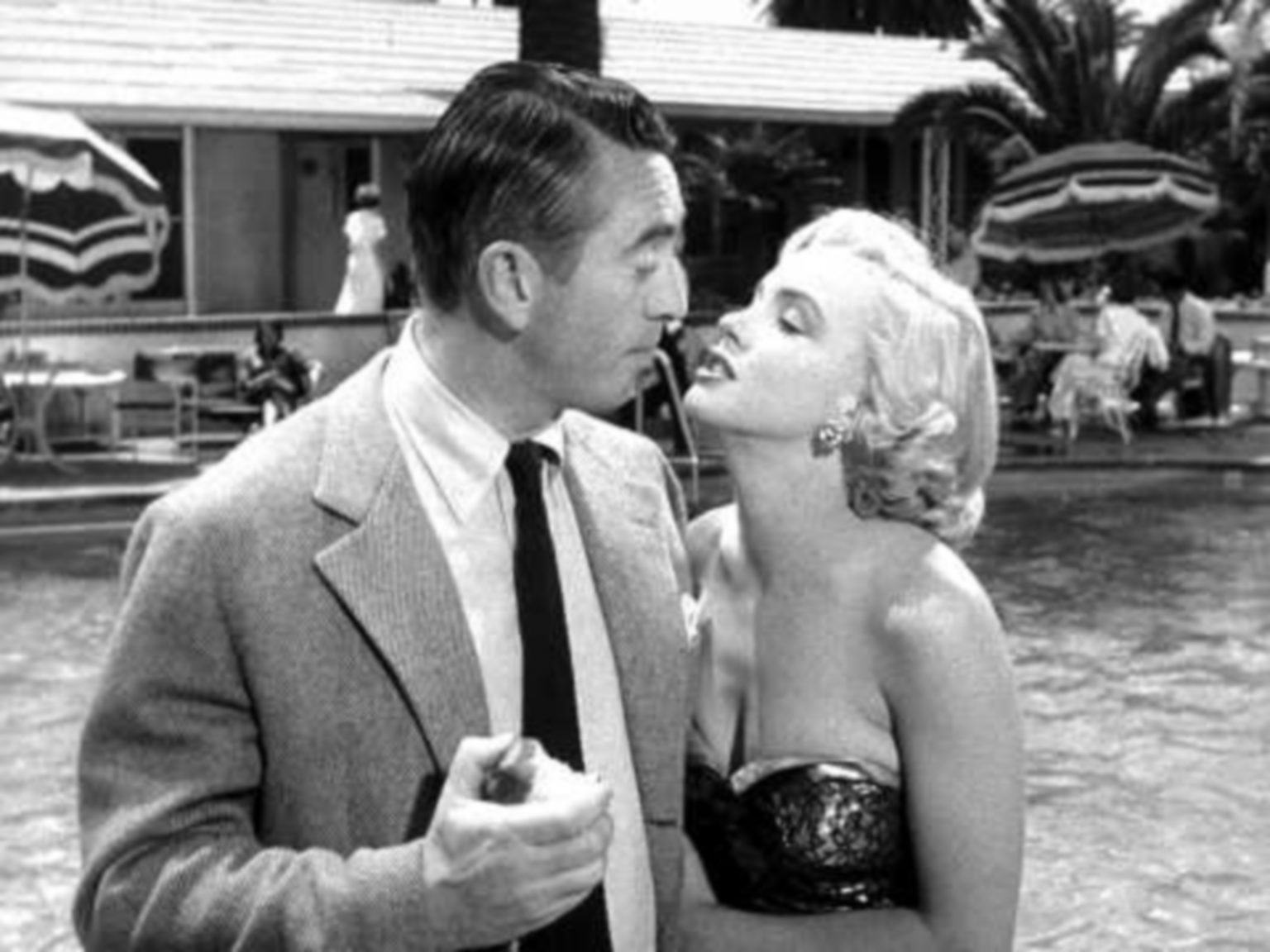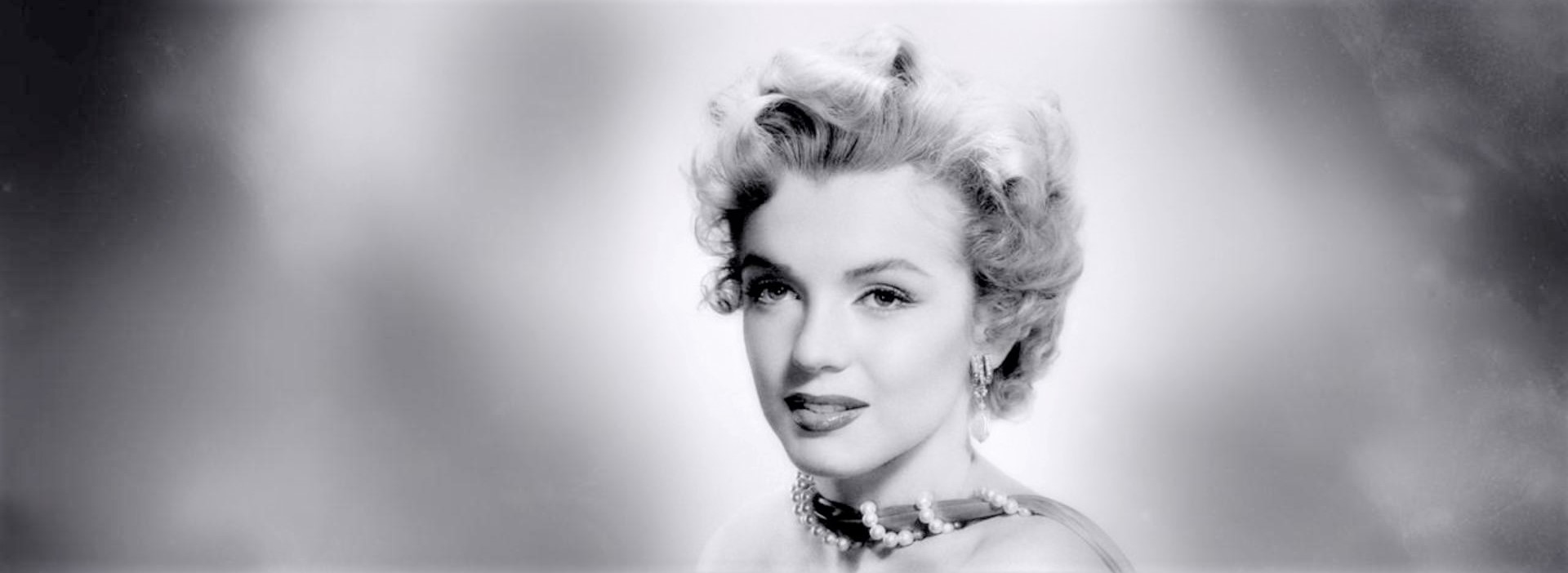Let's Make It Legal
31 October 1951
Marilyn’s Silly Secreatry Trilogy, Movie Number 3

I am always amazed by the diverse opinions reviewers hold of the same movie; and more often than not, a movie receiving poor reviews is actually pleasant and entertaining. Let’s Make It Legal is a case in point. The reviews I encountered for this movie used adjectives like “dull” and “boring” or “arid”. The movie is, in fact, a cone of cotton candy, romantic fluff, a farcical depiction of the relationship between a divorced couple. However, I did not find it dull or boring or arid. And, frankly, there are times when some romantic fluff and a silly farce are just what a fellow needs, that is if the fluff features three lovely women: Claudette Colbert, Barbara Bates and last but not least, the girl with the shape, Marilyn Monroe. Miss Colbert makes a fetching grandmother, for true; and in our sex obsessed, permissive society she could land a starring role on one of the many web sites dedicated to the sexual exploits of older, aggressive gals known affectionately as Cougars.
Miriam and Hugh Halsworth, played by Claudette Colbert and Macdonald Carey, have been husband and wife for twenty years, and for most of those years, according to Miriam, she was not number one in Hugh’s life. In order of importance, she was third behind his gambling and rose obsessions. It may have taken her nineteen years to reach her decision but she finally ordered Hugh out of their house and filed for divorce. The clock’s midnight knell on the day our farce begins will signal the expiration of one year since she filed and their divorce will become final. Their daughter, Barbara, played by Miss Bates, is distressed by this impending disaster. She and her husband, Jerry, played by Robert Wagner, and their small daughter, Anabella, live with grandmother Miriam. Hugh is living at the Miramar, a swank Los Angeles hotel where he is also employed as publicity manager. Jerry is Hugh’s assistant. It’s all rather cozy, I know.
Zachary Scott plays Victor Macfarland, local legend: a self made millionaire with political aspirations and the world’s most eligible bachelor. Victor just happens to return to Los Angeles on the same day our romantic fluff commences. He and his entourage check into the Miramar where Hugh and Jerry greet them. Jerry is surprised to learn that Victor and Hugh were once young rivals competing for Miriam’s heart. Hugh won the competition, but only because Victor mysteriously disappeared. When Jerry reveals that Hugh and Miriam are divorced, or will be divorced at midnight on that very day, Mr. Macfarland is pleased.
Anticipating her freedom with earnest resolve, Miriam claims to be content; Hugh wants to remain married. His fate may be inevitable but he has yet to disappear. A sort of semi-resident in his former home, he has a key to the front door, keeps a change of clothes there and keeps his handkerchiefs in a drawer with some of Miriam’s things, meaning her underwear, I assume. He changes clothes in the stairwell after tending to his rose bushes. Miriam objects to Hugh’s shenanigans, but she does nothing to stop him from breezing in an out of the house. It’s apparent that Miriam and Hugh are still very much attached.
Barbara, the daughter, realizes that her parents still have feelings for each other and does everything she can to keep them married. As the hour of divorce nears, Hugh reveals his lingering feelings for Miriam. He promises to stop gambling. Miriam expresses doubt that he will ever be able to quit. Hugh responds: you wanna bet? In spite of that ill-timed wager, Miriam seems to be weakening. She even agrees to have dinner with Hugh. When they announce as much downstairs, Barbara is elated. Then the telephone rings. Hugh’s bookie asks Miriam to inform him that the horse, on which he had bet that morning, won and paid $1620. So much for a reconciliation. To complicate matters, Victor arrives, breezes in, calls Miriam darling and kisses her squarely on her mouth. He professes to still love her. This troubles Barbara but disgusts Hugh. He warns Miriam that Victor is a world class philanderer, sees her as the first girl he ever loved but lost. Miriam corrects Hugh: O, you couldn’t be more wrong. He says he never stopped loving me. Hugh states that Victor has no intention of wedding Miriam, not even if she drugged him. I’ll lay 20 to 1 against, Hugh wagers. You’re on! accepts Miriam and extends her right hand. As they shake hands, Hugh says: I thought you didn’t approve of gambling. Miriam answers: This will be a pleasure.
From this point forward, as you might conclude, the movie evolves (or devolves depending on one’s point of view) into a cute win-the-bet tussle between Hugh and Miriam. The tussle also involves Marilyn’s character, beauty contest winner, Joyce Mannering. She is also staying at the Miramar and is interested in America’s most eligible bachelor. Hugh promises to arrange for them to meet, which he does, arranges for them to literally bump into each other at a dance. Obviously, Hugh intends to use the younger woman to attract Victor away from Miriam. Victor, however, is totally disinterested in Joyce. So in spite of Hugh’s valiant efforts, his ex-wife wins the bet and accepts Victor’s marriage proposal. Victor’s political aspirations interfere with their wedding plans: he must fly to Washington. Miriam accompanies her soon to be husband to the airport and while there, she convinces him to reveal why he disappeared from her life all those years ago.
What she learns makes her so angry with Hugh that she telephones him and threatens to destroy his rose bushes. Hugh can’t allow that to happen so he arrives at his former house on a rescue mission. One thing leads to another. All the members of our cozy, nuclear family, even Anabella, end up at the police station. The following morning, the newspapers feature a front-page story about Victor’s fiancé, her ex-husband, the police and some hot rose bushes. Even though Miriam is already packed and preparing to leave for the airport, anticipating her flight to Washington and Victor, he telephones and tells her not to come to Washington: her embarrassing late night escapade with Hugh and the fuzz represents some bad publicity that he must avoid. Hugh arrives to give Miriam his door key and the telephone conversation becomes tense after Victor hears Hugh talking in the background. Ultimately, Victor says some things he shouldn’t, convincing Miriam that he’s merely using her in his political machinations. So Miriam ends the relationship, ends it just like that.
But Hugh ain’t home free just yet. It seems the reason Victor disappeared all those years ago was because he lost Miriam to Hugh in a game of craps. How could you, Hugh, she demands to know, risk losing me on a capricious roll of the dice? From his key chain, Hugh produces the very dice that he and Victor used to determine which man would win Miriam. He instructs her to throw them. She does, thrice, each time rolling in a 4 and a 3, each time rolling a winner. Then it hits her: You cheated! Hugh admits to deceiving Victor; but the stakes were just too high to do otherwise, all those years ago. Once more, happy days are here again and love prevails. All’s well that ends well. Hugs all around.

Of the low budget bedroom comedies in which Marilyn appeared for 20th Century-Fox, Let’s Make It Legal is my favorite, primarily because of Claudette Colbert and Macdonald Carey. Like all fifties movies of this type, this one has its share of deficiencies, absurdities and silliness; but I am willing to forgive those simply due to the performances of ex-husband and ex-wife. As previously stated, Claudette, a natural and unaffected actress, makes for a very fetching and convincing grandmother; and in the role of a good man who’s lost control of his once well-ordered life, but remains capable of perceiving the humor surrounding him, Macdonald does a particularly convincing job. Zachary Scott is tolerable as the narcissistic and egocentric politician who hopes to marry the lovely divorcee and thereby complete his thwarted conquest from twenty years past.
Unfortunately, and even though they are extremely attractive persons, the acting of Barbara Bates and Robert Wagner, their portrayals of the querulous, bickering newlyweds, does not match the ease or naturalness of the two leads. Mr. Wagner is particularly wooden. Besides, Jerry and Barbara are just not very likable persons. Both are spoiled whiners but Barbara particularly. She shamelessly abuses her mother’s generous, helpful nature. Then she whines and complains because Jerry disapproves, whines and complains because Jerry wants a home of his own for his wife and daughter. Even though Barbara attempts to manipulate her parents, hoping to keep them married, she is motivated primarily by a selfish desire to maintain her care free life in which mother does most of her marital chores. And even though Jerry disapproves of his wife’s behavior, he’s not that much better. He attempts to manipulate the situation for his benefit as well, hoping to get Barbara out of her mother’s house so she can become his domestic slave, cooking, darning, cleaning and babysitting. By movie’s end, since Miriam plans to sell the house in which they are living, the newlyweds reach a resolution of necessity. However, since Miriam and Hugh end up reconciling, you have to ask yourself: how do the living arrangements ultimately end up? Unfortunately, we do not get to see that resolution.
I must mention an aspect of Jerry’s behavior that I consider to be particularly odd: he displays little interest in and no affection for his baby daughter, Anabella. When my daughter was that age, I could not have stopped myself from picking her up, kissing her or playing with her, even if I tried. I can’t stop myself from doing those things with babies I did not father, much less my own. Of course, I realize that our friend Jerry is just a character in a movie and the blame for his lack of paternal interest in his child is the responsibility of the men who penned the screenplay, meaning I.A.L Diamond and F. Hugh Herbert, both renowned screenwriters, particularly Mr. Diamond: he co-wrote many of Billy Wilder’s famous movies. Should I assume, then, that Jerry’s paternal indifference was not merely an oversight of the writers?
A dubious distinction, perhaps, but this movie was the first in which Marilyn found herself cast as the gold digging blonde, trolling for a wealthy husband. Once again, she is primarily window dressing even though Joyce has an actual purpose within the framework of the story: bait to lure Victor away from Miriam. And in that role, Marilyn gives an earnest and energetic performance. In her first scene, one with Hugh at the hotel swimming pool, she delivers her lines so rapidly one gets the impression that she just wants to get the scene over with as quickly as possible. She is more relaxed in the final scene, again with Hugh. At one of his poker games, she is an adornment who also delivers drinks to the male gamblers. Allegedly, this scene is a direct reference to Marilyn’s involvement with Joe Schenck and her appearance at his dinner table and his poker games as an adornment. Allegedly also, Marilyn, along with many other beautiful starlets, provided more than just bar tending services at Joe’s poker games. According to Marilyn, she and Joe Schenck were never more than friends and he did not expect that sort of activity from her; but her assertion has been labeled as untruthful by those who obviously know more about the intimate details of Marilyn’s life than she did. Since I wasn’t there, I don’t know; but I usually believe the woman’s story in such matters, particularly one not ashamed of her sexuality, like Marilyn.
At any rate, Marilyn’s career arc was about to make a dramatic shift in direction with her appearance in the Fritz Lang directed melodrama, Clash By Night.
